Our modern life sometimes presents many unpleasant surprises. Stress, excitement, anxiety have become constant companions of a person. When the next turmoil knocks out the calm, everyone begins to think about taking sedatives and stimulants. What to choose? What over-the-counter medication for depression can be bought at the pharmacy, aren't such drugs dangerous?
Fighting depression is a common part of modern life
Many people mistakenly believe that these are two groups of drugs that work the same under stress. But not everything is so simple. When you go to the pharmacy for the right drug, arm yourself with some knowledge of pharmacology.
Tranquilizers
Translated from Latin, the word "tranquilizer" means "tranquility." These are psychotropic medications that are used to treat many diseases. These drugs were first synthesized in the middle of the last century. And the term "tranquilizers" entered medical use in 1956. These drugs are often referred to as "anxiolytics".
Tranquilizers are medicines that remove symptoms of fear and anxiety from a person. They stabilize the emotional background without negatively affecting the ability to think and memory.
The main effect of these drugs is anxiolytic (anti-anxiety)... Thanks to this, the patient's feelings of anxiety, fear are stopped, anxiety and emotional tension are reduced.
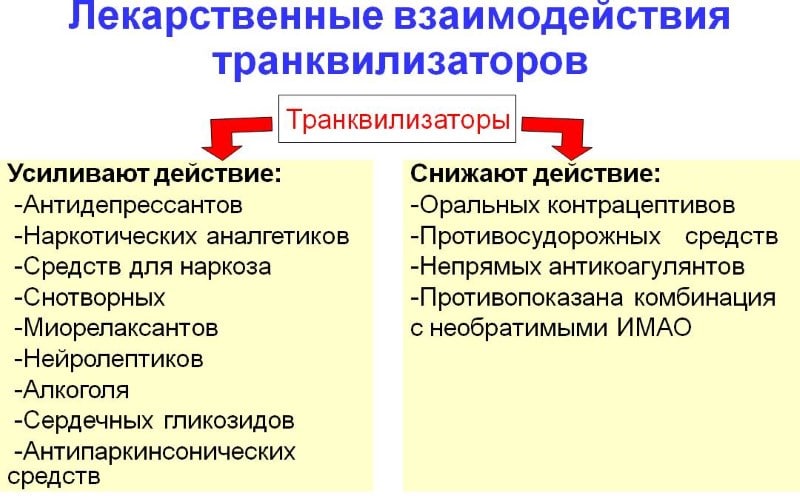 Interaction of drugs and tranquilizers
Interaction of drugs and tranquilizers Medicines also have an additional therapeutic effect:
- sleeping pills (fighting insomnia);
- sedative (reducing anxiety);
- anticonvulsant (relief of spasms);
- muscle relaxant (muscle relaxation).
Tranquilizers successfully help fight increased suspiciousness, obsessive thoughts, stabilize the state of the autonomic system, normalize blood circulation and lower blood pressure. But drugs of this level are not able to help a person get rid of hallucinations, delusional states and mood disorders. Other drugs are fighting this - antipsychotics.
Types of anxiolytics
The list of tranquilizers is regularly updated, so there is no clear classification of such drugs. The most common drugs are tranquilizers, the list of which belongs to the benzodiazepan class. They are divided into the following types:
- With a pronounced anxiolytic effect. The most powerful are Lorazepam and Phenozepam.
- Moderate action. These tranquilizers include: Clobazam, Oxazepam, Bromazepam and Gidazepam.
- With a pronounced hypnotic effect. These include Estazolam, Triazolam, Nitrazepam, Midazolam, and Flunitrazepam.
- With an anticonvulsant effect. The most common drugs that work to relieve a convulsive state are Clonazepam and Diazepam.
Antipsychotics... Antipsychotic medications or antipsychotics. These medicines are classified as psychotropic tranquilizers. They are used to treat various mental, neurotic and psychological diseases.
Modern doctors are ambiguous about the appointment of such drugs - neuroleptics provoke the frequent development of dangerous side effects.
When prescribing antipsychotic medications, it is recommended to use a new generation of atypical antipsychotics. They are considered the most gentle and safe for health.
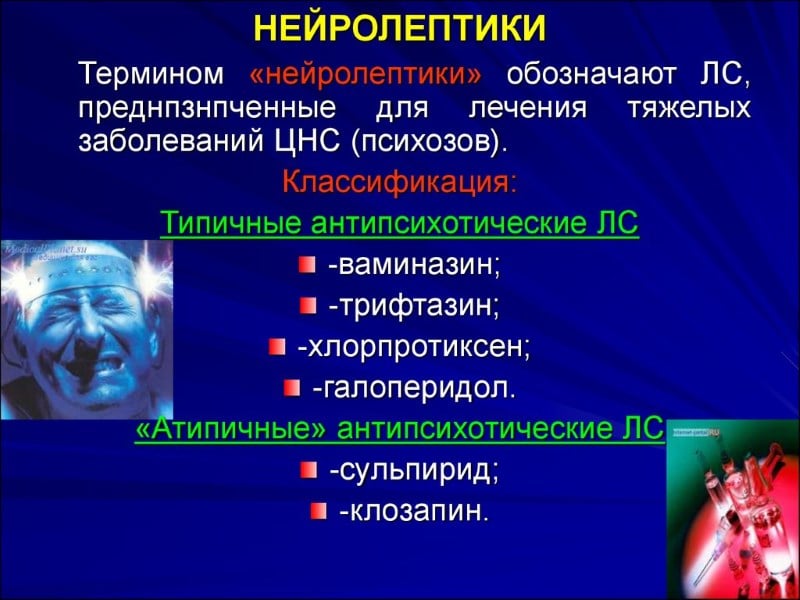 What are antipsychotics
What are antipsychotics The list of over-the-counter antipsychotic drugs is not as large as that of antidepressants and tranquilizers. In pharmacies, you can freely buy the following antipsychotics: Olanzapine, Chlorprothixene, Trifftazine, Thioridazine, Seroquel.
Do I need a prescription for tranquilizers
Benzodiazepane tranquilizers are drugs that can be purchased in pharmacies strictly by prescription. These drugs are addictive (decreased effectiveness) and addictive (mental and physical). New generations of anxiolytics are available over the counter. It:
Daytime tranquilizers... In terms of their medicinal composition, daytime anxiolytics are similar to benzodiazepanes, but have a more gentle effect. In daytime tranquilizers, the anti-anxiety effect prevails, and the hypnotic, sedative and muscle relaxant effect is minimal. A person, taking such medications, does not change the usual rhythm of life.
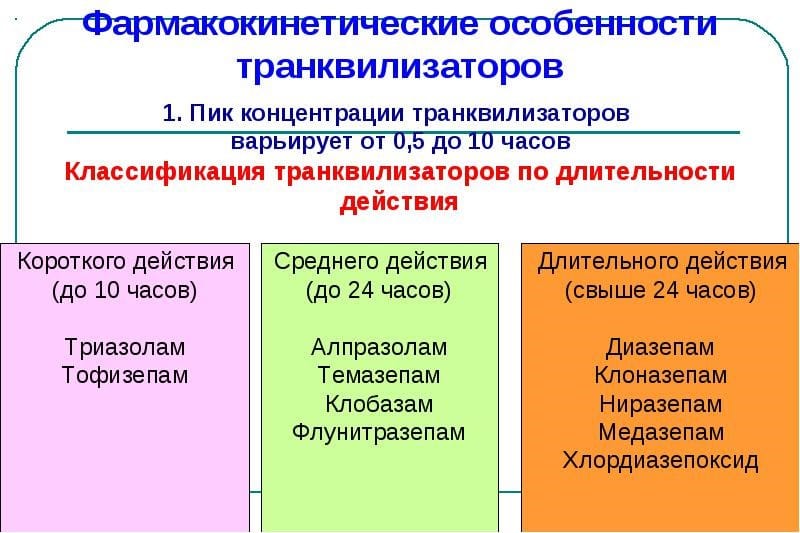 Features of tranquilizers
Features of tranquilizers Anxiolytics of the new generation... The clear advantages of such drugs include the absence of addiction syndrome (as in drugs of the benzodiazepane series). But the expected effect is much weaker, and the appearance of side effects (problems with the gastrointestinal tract) is often noted.
List of tranquilizers without a doctor's prescription
| Names | Indications |
| Phenazepam | Conditions of irritability, fear, and tension |
| Atarax | Anxiety, psychomotor agitation, increased irritability |
| Zoloft | Depression of various types, panic disorder, obsessive-compulsive disorder, post-traumatic conditions, social phobias |
| Paxil | Depressive states of any orientation and development, stress and post-traumatic conditions accompanying nervousness and anxiety, phobias |
| Etifoxine | Elimination of fear and anxiety, internal tensions, persistent mood decline against the background of somatic diseases, mild depression |
| Tofisopam | Neuroses, neurosis-like states, decreased activity, apathy, stress, emotional trauma, PMS, moderate psychopathic manifestations |
| Rudotel | Disorders of the psychovegetative and psychosomatic directions, manifestations of fear, anxiety, insomnia, irritability, neurosis-like states |
| Selnak | Asthenic anxiety disorders, neurasthenia, difficult adaptation, generalized anxiety states |
| Afobazol | Irritability in the fight against smoking, neurasthenia, adaptation period, alcohol withdrawal, chronic somatic diseases |
| Tenoten | Neuroses and neurosis-like disorders, psychosomatic diseases, stress disorders, moderate damage to the central nervous system, irritability |
| Deprim | Emotional and psychovegetative disorders, climacteric syndrome, PMS, depression, low mood, fears, anxiety, depressive manifestations |
Antidepressants
Antidepressants are medicines designed to fight the manifestations of depression. Depression- mental disorder, accompanied by a drop in mood, a decrease in intellectual abilities and motor skills.
A depressed person cannot adequately assess his personality and often suffers from somatovegetative disorders (loss of appetite, muscle weakness, chronic fatigue, insomnia, lethargy, absent-mindedness, etc.).
Antidepressants do more than stop these symptoms. Some of these drugs even help fight smoking and bedwetting. They work as pain relievers for pain of a chronic (lingering) nature.
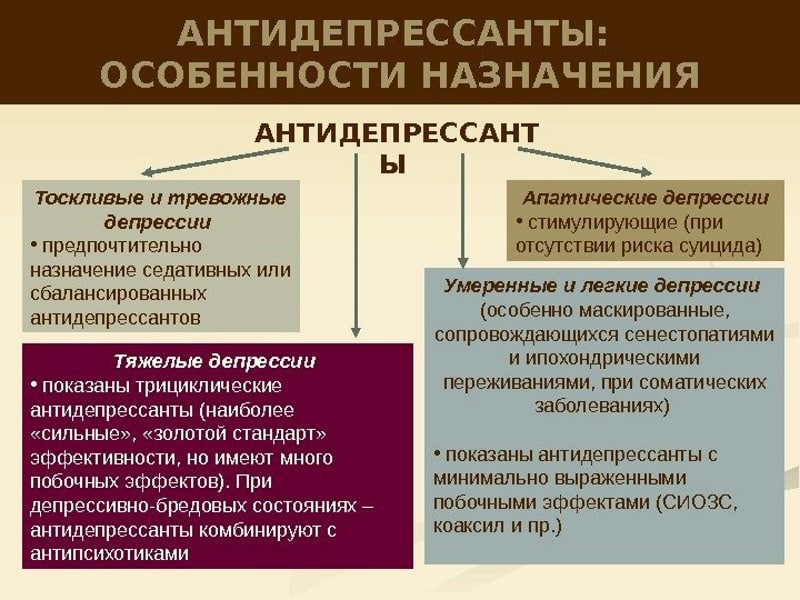 Conditions for prescribing antidepressants
Conditions for prescribing antidepressants New generation antidepressants are considered to be the most effective. They relieve depressive symptoms subtly, delicately, without causing side effects and addiction.
Types of antidepressants
All drugs in this group are divided into two broad categories:
Timiretics... Stimulants. They are used in the fight against depression, which is accompanied by a depressed state of the personality and pronounced depression.
Thymoleptics... Means with pronounced sedative properties. Such antidepressants minimize anxiety, have a relaxing effect, restore healthy sleep and relieve psycho-emotional state. Tymoleptics do not affect the state of the central nervous system in any way (they do not depress it).
Antidepressants-thymoleptics are effective in the treatment of depressive conditions, which occur with manifestations of excitement and irritability.
 Features of taking antidepressants (food compatibility)
Features of taking antidepressants (food compatibility) Antidepressants are also subdivided into types that differ in their mechanism of action:
- Stopping neuronal uptake of monoamines. These include indiscriminate drugs (blocking the seizure of norepinephrine and serotonin). These are tricyclic antidepressants: Maprotelin, Fluvoxamine, Reboxetine, Amisole, Melipramine.
- Monoamine oxidase inhibitors (MAO-B and MAO-A inhibitors). These are: Transamin, Autorix, Nialamid, Moklobemide, Pirlindol.
Also, antidepressants are divided into:
- drugs with a sedative-stimulating effect (Pyrazidol, Imipramine);
- drugs with a clear psychostimulating effect (Moclobemide, Transamin, Fluoxitin, Nialamide);
- drugs with a sedative effect (Trazadone, Amitriptyline, Tianeptine, Pipofezin, Mirtazalin, Paroxetine, Maprotiline).
The most widespread are antidepressants with a blocking effect on the seizure of monoamines. Such drugs are most effective, their therapeutic effect is observed after 2-3 weeks of administration.
Do I need a prescription
A prescription for the purchase of antidepressant drugs in pharmacies will become necessary only in the following cases:
- Exacerbation of the disease.
- Therapy for severe and long-term depression.
- If there is an atypical course of the disorder.
Treatment of depressive conditions in mild forms can be carried out with the help of drugs that are sold freely in pharmacies (over-the-counter). Non-prescription antidepressants, the names of which are presented below, are new generation drugs.
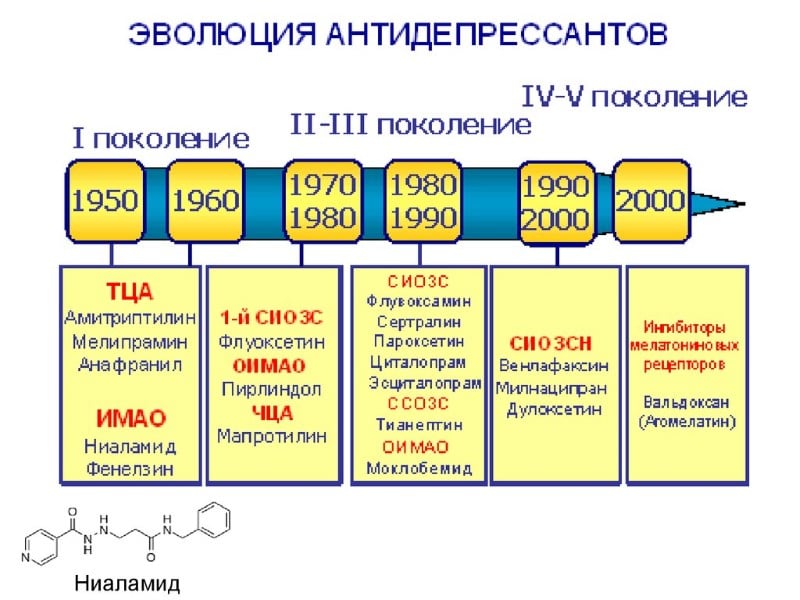 New generation antidepressants "saw the light" in 2000
New generation antidepressants "saw the light" in 2000 Modern drugs have an undeniable advantage over the antidepressants previously produced. They give much fewer side effects, are not addictive, and have a quick healing effect on the body. The new generation of drugs can be combined with the simultaneous administration of other drugs.
List of over-the-counter antidepressants
| Names | Indications |
| Maprotiline | Menopause, neurotic, psychogenic, endogenous and involutional depression, exhaustion, neurotic states, psychomotor retardation |
| Prozac | Bulimia / anorexia nervosa, obsessions, thoughts, obsessive-compulsive disorder, psychogenic depressive states, emotional overload, PMS |
| Paxil | Depressive states of all types (the drug is approved for use in children from 7 years old), suicidal thoughts |
| Deprim | Chronic fatigue, emotional overload, nervous exhaustion, decreased ability to work, apathy, lethargy, irritability |
| Azafen | Asthenodepressive manifestations, depression accompanied by anxiety and irritability, alcohol abstinence, PMS, depression in case of somatic diseases |
| Amitriptyline | Manic-depressive psychoses, bulimia nervosa / anorexia, enuresis, anxiety, insomnia |
| Mirtazapine | Loss of interest in life, depression, accompanied by increased anxiety, lethargy, lethargy, sleep problems |
| Herbal preparations | |
| Leuzea extract | Anxiety, decreased mood, apathetic neurosis-like states, decreased general tone, lethargy, chronic fatigue, impaired concentration, mood drop |
| Ginseng tincture | Severe nervous exhaustion, loss of tone, increased fatigue, low efficiency, hypotension, overwork |
| Lemongrass tincture | Neurasthenic states, decreased tone, decreased ability to work, depressive manifestations, hypotension |
| Persen | High nervous irritability, depressive manifestations, insomnia, irritability, anxiety, suspiciousness |
| Novo-Passit | Neurasthenic manifestations, increased anxiety, insomnia, chronic fatigue, lethargy, decreased ability to work |
You can at least buy pills for depression without a prescription at any pharmacy. With all the safety of antidepressants and tranquilizers, do not get carried away with self-medication! Prior consultation with a doctor is mandatory. It is categorically impossible to take such medicines for a long time! Don't forget about the long lists of contraindications for such remedies. Take care of your body.

